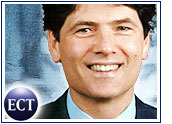
Quite a few companies are offering solutions that provide automated customer service in one way or another. There is a lot to be said about this trend, and much of it is good.
The days of long waits on hold or frustrating attempts to navigate a series of phone menus are winding down, and in many cases they are being replaced by more “humane” systems that provide information fast. Part of the reason for this shift is that more of us are seeking help on the Web rather than through the phone system. Like looking for a song on a CD instead of on a tape, there is simply more you can do — and faster — in a browser.
Of course, this shift is all made possible by a massive private investment in infrastructure, as our society has geared up with computers and fast Internet service and Web-ready cell phones. Many of us hardly miss talking to a customer service representative if we can take matters into our own hands and Google our way to answers.
One Step Back
But just as we are getting accustomed to doing it ourselves and vendors are spending big on new systems that will help them save even bigger on support costs, the ground is shifting again. Many organizations are trying to figure out how to generate more revenue, especially from the service center.
The logic is simple. If you have a customer on the phone, why not try for an upsell or cross-sell once the service problem is taken care of? Some people — including me — would say that in many cases the highest form of service is being able to anticipate your customer’s needs, so that the upsell suggestion is greeted as a positive part of the support process.
Of course, you can’t very well try for the upsell if the customer is performing self service, because your customers don’t want to be annoyed by a pop-up ad at those moments. The problem gets bigger when you realize that while you may have a good group of customer service representatives, few of them are natural sales people.
If you are going to succeed at deriving revenue from the service center, you will need to restructure the operation. For starters, the metrics you use — such as call time, average wait time and other measures of efficiency — need to be replaced by metrics that analyze how well a representative follows a strategy designed to welcome, support or service, and only then attempt to sell. Such a strategy maintains the mission of the service center and, if done well, should foster loyalty in the customer so that even if the current attempt at a sale fails, the overall customer experience will be positive and draw the customer back another time.
Getting It Done
Doing all that will require technology that goes beyond timers and queue managers. It will also go well beyond what you can expect from workforce managers and e-learning tools alone. Let me suggest three goals for attempting to turn a service center into a service center that reliably generates revenue.
- People: The call center must become self-optimizing. Advanced call center solutions must be able to evaluate and diagnose the performance of human capital for every call, identifying knowledge deficits that can impede performance and result in suboptimal customer satisfaction and missed sales opportunities. It will fine-tune performance by using analytics and metrics derived from the call center’s best practices combined with the industry’s best practices. Importantly, these metrics must be backed up by incentives that are achievable and that are directly related to the new mission of call center selling.
- Process: Call center processes must become self-configuring. No one can remember everything, so a self-configuring call center must have the ability to access and present in real time the information — not just scripts — that call center representatives need during a call to solve problems and make appropriate offers. It must also catalog and track employee skill levels and be able to train the staff by managing time during off peak hours to ensure that each staff member is up to date on the latest advances in product, messaging and positioning.
- Technology: Call center processes must become self-correcting. A self-correcting call center will use analytics to identify sales opportunities and deliver appropriate information to the agent. But it will also diagnose deficiencies in the staff’s knowledge of the company’s own processes and procedures or product attributes. Moreover, the system will also use its analytics to identify optimal periods when education can be most effectively performed, and it will offer multiple testing modes on real systems to ensure that lessons are internalized and applied.
Culture Change
Finally, analytics will also make it easier for human managers to see through numerous non-critical issues to identify and concentrate on matters that are material to profit and customer loyalty.
At the end of the day, this is all about a major culture shift. When the service center is viewed as a cost center, a lot of energy is expended in trying to save money, even at the expense of frustrating customers. On the other hand, if the service center is seen as the revenue center it has the potential to be, other, more proactive disciplines will take over.
Denis Pombriant is founder and managing principal of Beagle Research Group. An influential thought leader in the CRM industry for more than five years, Pombriant researches emerging trends in CRM and publishes research reports that can be found on the company’s Web site and on other influential Web sites in the CRM market. In 2003 CRM Magazine named Pombriant one of the most influential executives in the CRM industry. He is also quoted extensively in Paul Greenberg’s CRM at the Speed of Light, third edition. His latest report is titled “KeyFindings: CRM Market Events, Observations, and Analysis 2004.”













































